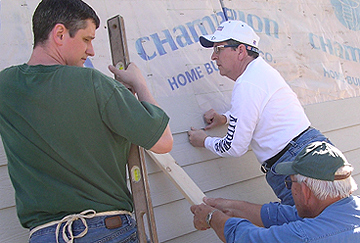Abraham was the father of Isaac, and Isaac the father of Jacob, and Jacob the father of Judah. But it’s a safe bet they never had to work together.
But today several generations are crowded into the workplace. From young adults in their 20s to people working well into their 70s, employees of different ages are bumping up against each other, bringing different worldviews and habits to work.
Church leaders and generational researchers say younger pastors, like other younger workers, tend to be more collaborative and less interested in hierarchical forms of authority. They are insistent about observing boundaries between work and home life. And their denominational loyalties don’t prevent them from reaching out to other groups.
In some ways, Christian organizations are no different from other workplaces in this regard. But for a church woefully short of young pastors and anxious about attracting a new generation of leaders, the issue has particular significance.
“It’s about learning how to speak and work with one another in a changing culture, rather than staying in a safe place,” said the Rev. Kevin Armstrong, 48, pastor of North United Methodist Church in Indianapolis.
Talking ’bout my generation?
The impact of a multigenerational workplace has received enormous attention in recent years. But reports of generational conflict should be viewed skeptically, said Paul Arsenault, chair of the marketing department at West Chester University of Pennsylvania and a researcher on generational issues. The reality, he said, is more nuanced.
Yes, generational differences are real and a factor that managers and leaders need to keep in mind, but the generations have much in common, he said.
“It’s important to be aware of and understand generational differences but not to overstate them,” Arsenault said. “If you’re going to manage people, if you’re a church leader who wants young people to stay in ministry, you need to understand who they are and how they tick. But these are not totally different human beings.”
Questions to consider
Questions to consider:
- How can conversational space be created between intergenerational leaders that honors both tradition and innovation?
- What are the advantages of downplaying hierarchical status and structures?
- How do Christian leadership and hospitality play into multigenerational differences? Can these Christian aspects be practiced under hierarchical structures?
- Who’s “not at the table” if only younger pastors or only older pastors lead congregations? What are the advantages of multigenerational leaders working together?
- In denominations based upon the ruling of elders (Presby, for example, is the Greek root for elder), what does it mean for the young and old to work together? What can young pastors learn from older pastors that might help them with collaboration, leadership and hospitality?
Honoring tradition, embracing change
Indeed, generational differences in pastoral leadership are nothing new, Armstrong said. They are a perennial issue for the church.
“Good pastors have always wanted young clergy around,” he said. “The problem is that we expect them to act like they’re 50.”
That is, older pastors have always expected younger pastors to fit into existing modes of leadership, Armstrong said. Underneath is a more fundamental issue the church has struggled with from the beginning: how to maintain traditions while adapting to new generations.
Or as the writer of Ecclesiastes 1:4 put it, “A generation goes, and a generation comes, but the earth remains for ever.”
But Armstrong and others say they do see some trends among many young pastors. Many -- like younger workers more broadly -- are more interested in shared leadership and relationship-building than in formal, hierarchical structures of leadership and authority, said the Rev. Wesley Granberg-Michaelson, 63, general secretary of the Reformed Church in America. They don’t assume that power and authority flow only from those in official positions but believe it should instead be held and shared widely.
Though loyal to the denomination, that loyalty is not blind, Granberg-Michaelson said. Younger pastors might look first for help within their denomination but they will work with others to accomplish their congregation’s mission and goals.
In Alabama, the Rev. Brent McDougal, 38, sees these same trends among young pastors in the Cooperative Baptist Fellowship, which he serves as state coordinator. After decades of battles in Baptist life, many young CBF pastors no longer rely solely on a denominational structure, McDougal said.
“The younger generation is indifferent to the fights of the past over who controls the denomination,” he said.
Rather than taking orders from above, these pastors cultivate a sense of mission in their congregations and then find the most suitable partners.
“It bubbles up from below and then they go looking for partners to fulfill whatever God is inspiring,” he said.
The Rev. Chris George, pastor of First Baptist Church in Mobile, Ala., could be the poster boy for McDougal’s younger pastor. At 32, one year into his first senior pastorate, he has a deep distaste for hierarchy and, though a committed, lifelong Baptist, he does not feel exclusively bound to that tradition in such matters as doctrine and scriptural interpretation. Having taught at an Episcopal school and served as a youth pastor at a United Church of Christ congregation, he describes himself as “very ecumenical.”
A downtown church, First Baptist Mobile partners with congregations from many denominations to address homelessness and other community challenges. Rather than simply writing a check to the CBF or the Southern Baptist Convention for mission work as it did 10 years ago, First Baptist now takes a hands-on role in almost half its mission efforts.
Last summer, the church sent a team to South Dakota to work with two United Methodist missionaries on a Lakota reservation. Next summer, they will work with Baptist mission teams in Alabama, United Methodists in South Dakota and an ecumenical group in Ukraine.
“What the larger Baptist body is saying and doing has a lot less bearing on what plays out in our congregation than it did for my predecessors,” George said.
‘Trying to keep the church from becoming a club’
For those who have always been in charge, this new style of leadership can be frightening.
“To bring in a new idea, a new way of praying, of baptizing, of teaching, can be very unsettling,” Armstrong said, but added: “Younger pastors aren’t saying to older pastors, ‘We want to toss out all your hard work and ideas.’ They’re saying, ‘We want you at the table, but we want others as well.’”
To Armstrong, intergenerational issues in pastoral ministry come into play primarily in two related areas: leadership and Christian hospitality.
“Collaboration is essentially about leadership and how we learn to share it, as opposed to the top-down model that I grew up with,” he said. “Underneath that is the related and, for Christians, more pressing, issue of hospitality. What does it mean to learn from and to welcome persons who are different?”
The benefit of such an approach, Armstrong said, is that it forces a church grown complacent to rethink its priorities and practices. Young leaders are creating new opportunities to practice hospitality.
Young pastors who grew up in a global culture and who are more open to engaging social issues such as poverty, AIDS and the environment are pushing the church to be an oasis of the kingdom of God within the broader culture,” McDougal said.
“These younger pastors are trying to keep church from becoming a club,” he said.
In Armstrong’s congregation in Indianapolis, young interns and associate pastors expect they will collaborate with others, reaching out and involving as many people as possible in decision-making.
“They are always asking ‘Who are the hidden folks who have ideas to share?’” Armstrong said. “They have grown up in a more culturally diverse world and so they are always asking who’s not at the table.”
Work, life and balance
A second area where generational differences commonly arise in pastoral ministry is work-life boundaries. After years of reports about pastoral burnout, many seminaries and denominational offices now emphasize the importance of work-life balance and good self-care. McDougal said most young pastors try to develop healthy practices right out of seminary.
At First Baptist Mobile, for example, George has rigorously observed boundaries between home and work. Like any pastor, he occasionally has to work a 70- or 80-hour week, but he refuses to allow those to become routine.
“One night, we had a deacons’ meeting that lasted until 11 p.m.,” George said. “I told them I wouldn’t be coming in the next day because we had taken time that I should have spent at home with my wife and family.”
Frances Kunreuther, co-author of “Working across Generations: Defining the Future of Nonprofit Leadership,” said conflicts between work and family life are one of the most important issues for younger staffers in nonprofit organizations. In surveys she and others have conducted, young non-profit leaders and staff express significant anxiety and frustration about work-life issues.
“The younger generation is really putting their foot down on the number of hours they are expected to work,” said Kunreuther, project director for the Building Movement Project, an advocacy organization for non-profits.
Though Kunreuther’s research addresses generational change in nonprofit organizations, her findings likely apply to those in ministry and other fields. Like pastoral ministry, social-change organizations have historically had a workplace culture in which employees can never give enough, Kunreuther said. As a result, young employees’ demands for shorter hours or better pay are sometimes viewed by older nonprofit leaders as a lack of commitment, a sign that “kids today don’t want to pay their dues.”
Kunreuther, however, cautioned against passing that culture on to future generations.
“We need to back up and assume there is legitimacy on both sides,” she said. “We have to be better at listening to each other and assuming good, rather than bad, intentions.”
‘We want to share in this life’
While work-life issues typically surface within individual congregations, some of the most important challenges of generational change are felt at the denominational level. Indeed, for many young pastors, the whole shape and role of denominational structures is up for discussion.
In Baptist life, many young pastors are no longer willing to invest a significant amount of energy in a denominational organization, McDougal said. For CBF, the challenge is to create a vibrant partnership for congregations that have grown weary and skeptical of denominational bodies.
“Many people sense a bondage in these old structures and so there is a real desire in CBF to create something new, different and life-giving,” McDougal said.
This skepticism isn’t unique to Baptists. Granberg-Michaelson said many young pastors in the Reformed Church have little interest in serving on denominational committees and synods.
“When I look at our assemblies, our synods, our classises and consistories, the average age in these bodies is pretty scary,” he said. “The culture of their meetings, the way they function, is pretty foreign to young people.”
Granberg-Michaelson said the RCA has had success in providing young pastors with other avenues for leadership training and connection, offering opportunities to be mentored by older pastors or creating networks and retreats around specific issues.
The Rev. Steve Pierce, 31, an associate minister at Marble Collegiate Church in New York City, was one of about 20 young RCA pastors who attended an “emerging leaders conference” Granberg-Michaelson convened in Nashville, Tenn., last fall. He said the discussion helped him to understand more deeply that in the RCA, final authority does not reside in one individual or a congregation, but in a series of representative groups.
United Methodists too are discovering that denominational gatherings can bring generational differences to light. Last year’s meeting of the North and South Indiana Annual Conferences featured a series of large gatherings on the theme “Our Life Together.” But during the meeting, Armstrong said, younger pastors asked that time be set aside for more small-group discussions.
“This was clearly a meeting that had been designed by people my age and older,” Armstrong said. “Some of the younger clergy rightly reminded us that ‘Our Life Together’ would be nurtured if we spent more time talking with each other instead of just going from one large session to the next.
“What they were saying was, ‘We want to share and participate in this life. So give us a chance to speak and to listen.’”










